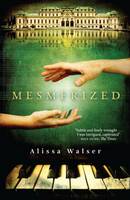Life has scuppered several plans I had this month, including taking part in German Literature Month. Still, I’ve managed to read this, the latest novel by Juli Zeh. I have read Zeh once before, when I reviewed Decompression for Shiny New Books. Like that novel, New Year is set in Lanzarote – and it’s an interesting character portrait.
Henning has taken his young family to Lanzarote for a surprise Christmas break. He might have been hoping to get away from life’s problems, but the trip soon creates issues of its own, such as another man flirting with Henning’s wife Theresa.
On New Year’s Day, Henning resolves to make a new start, and cycles up into the mountains. The first part of the novel alternates between Henning’s bike ride and his reflections on the current holiday and his life. There’s a real sense here of the environment and Henning’s state of mind.
We learn that Henning has panic attacks, caused by something buried in the past. When he reaches the summit of his ride, something about the place doesn’t feel quite right. A memory stirs – and, for the rest of the book, we see what happened in Henning’s childhood. In effect, New Year is structured like Henning’s bike ride: the journey to the top that maps out Henning’s present and recent past; and the exhilarating ride down again, as we discover just why Henning is the way he is.
Published by World Editions.




Recent Comments